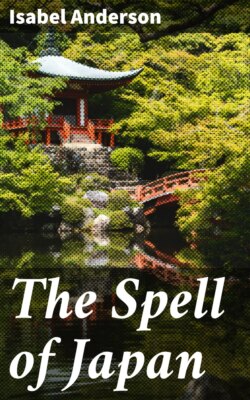Читать книгу The Spell of Japan - Isabel Anderson - Страница 3
На сайте Литреса книга снята с продажи.
INTRODUCTION
ОглавлениеTable of Contents
The term "Spell," as applied to a series of books treating of various countries seems instantly to conjure up before the vision the most romantic and attractive episodes in their history, the most picturesque and fascinating aspects of their geography, the most alluring qualities of their inhabitants. Under this ample and elastic term, Romance has been able to weave its iridescent glamour, if possible enhancing the charm of the reality, like a delicate veil over a mountain view.
The fortunate authors have been enabled to take journeys as it were on Solomon's magic carpet, the aerial vehicle of the Imagination, and to depict ideal conditions based nevertheless on solid foundations of Truth.
Occasionally Fate seems to idealize reality: a novelist could hardly conceive a more fortunate setting for a romance than the Court of an Oriental Potentate, or find a happier source of vivid experiences than would spring from the position of an open-eyed American woman suddenly transported to such a scene as the wife of an ambassador sent to some exotic Empire. Fiction in such a case is transcended by actual fact and there would be no need of inventing opportunities of inner observation: every door would stand open and the country would be revealed in its highest perfection.
In this respect Mrs. Anderson's "Spell of Japan" differs perhaps from most of its predecessors in the series of "Spell" books. Her husband was appointed by President Taft in 1912 Ambassador Extraordinary and Minister Plenipotentiary to the Court of His Majesty the Mikado, and the whole time of their sojourn in Dai Nippon was filled with experiences seldom vouchsafed to foreigners. They witnessed functions to which they were admitted only because of their official position; they were granted every facility for seeing aspects of Japanese life which ordinary visitors would have infallibly missed, and they became acquainted with the very flower of Japanese civilization.
Mrs. Anderson took copious notes and she has utilized these in the preparation of her most delightful and illuminating volume. It is so naturally and unostentatiously written that one almost forgets to be amazed at the intimacy of the pictures: one enters the Imperial palaces and attends Court functions as simply as one would go to an afternoon tea at home. Then perhaps suddenly comes the realization of what a privilege it is to be admitted to see through her keenly observant eyes the penetralia so jealously hidden from the general throng.
The book therefore is rightly entitled to carry the title of Spell, for it shows Japan at its very best; it makes one understand the glamour which the courteous manners, the elaborate customs, the harmonious costumes, the perfect Art everywhere displayed, cast over all those who have been fortunate enough to visit the Land of the Rising Sun.
Mrs. Anderson's book cannot fail to serve as a new and important tie of friendship between the United States and Japan; it will be hailed as an eminently fair presentation of Japanese ideals, and will from its authoritative accuracy and its admirable spirit give great pleasure to all in the best circles of the Empire and serve to do away with many prejudices which ignorance has disseminated among our own people. It could not have breathed a more conciliatory and friendly spirit, and its simple and engaging style cannot fail to win golden opinions for its talented author.
Nathan Haskell Dole.
